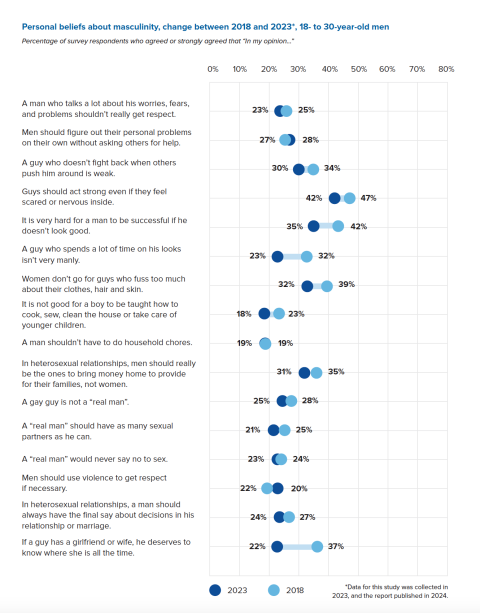
Traditional models of how to be a man face growing criticism in the twenty-first century, with increasing attention to the harms they cause among men, women, and communities. Social norms regarding manhood are diverse across cultures, history, and within any one society. But one version of manhood increasingly is seen as a problem, the version in which men are expected always to be tough, aggressive, risk-taking, stoic, heterosexual, homophobic and transphobic, emotionally inexpressive, hostile to femininity, and dominant. This form of masculinity is identified as oppressive for women, restrictive and limiting for men, and implicated in systemic gender inequities and other social problems (Flood, 2022; The Men’s Project & Flood, 2018).
To what extent, then, do men themselves endorse this model of how to be a man? To what extent do men think that it is this version of manhood that they are expected or pressured to live up to? And how does this model of masculinity play out in men’s own behaviour? The Man Box surveys answer these questions. Based primarily on a survey of young men in Australia aged 18-30, the Man Box research provides an invaluable mapping of patterns of masculine attitudes, norms, and behaviours. In the following, I comment on the Man Box findings and their significance, focusing on the sample of young men aged 18-30.
A model of traditional masculinity, based in being tough, stoic, homophobic, and so on, does not receive majority support among young adult men in Australia. Among young men aged 18-30, most do not endorse this version of manhood. Also, most men (although fewer) do not think that society is encouraging this version of manhood among them, and comparing the data from 2018 and 2023, the messages young men receive about manhood have improved in some ways. This is encouraging news. It suggests that healthier, more gender-equitable, and more inclusive norms of manhood are relatively common among young adult men in Australia, and that there has been some decline over the past five years in unhealthy and gender-inequitable norms of manhood.
There are, however, real reasons for concern. First, anywhere from one quarter to one third of young men endorse rigid, dangerous, or sexist models of manhood. Second, this endorsement is not declining fast. Men’s levels of endorsement of traditional masculine ideology generally are steady, and we should put aside any assumption that unhealthy and sexist social norms inevitably will drop away over time. Traditional models of how to be a man continue to have a powerful influence on many men’s and boys’ lives and relations (Flood, 2019). There has been little change in the past five years in men’s attitudes towards male aggression, male stoicism and self-sufficiency, domestic labour as women’s work, homophobia, or hypersexuality, and substantial changes only in men’s endorsement of male surveillance of their female intimate partners and men’s comfort with grooming and fashion. Third, young men are still receiving societal messaging that reinforces these rigid and sexist models of manhood. Although there are significant and positive shifts in the societal messaging young men report receiving, their own attitudes are not necessarily following course.
Finally, young men’s endorsement of traditional masculine norms is playing out in a range of problematic behaviours. One quarter of young men have used physical violence against an intimate partner, one fifth have used sexual violence against an intimate partner, and both sets of behaviours are more likely among the young men who more strongly endorse the Man Box norms. Traditional masculine norms also constrain young men’s own health and wellbeing. Some have considered suicide and self-harm, some are drinking at dangerous levels, some are taking risks while intoxicated or drug-affected, and some are problem-gambling. Again, all of these are more common among the men with the highest conformity to Man Box rules.
FOR THE REST OF THIS COMMENTARY, please see the PDF document here.
Citation: Flood, M. (2024). Norms of manhood among young men in Australia. In The Men’s Project and M. Flood, The Man Box 2024: Re-examining what it means to be a man in Australia. Melbourne: Jesuit Social Services (pp. 109-127).